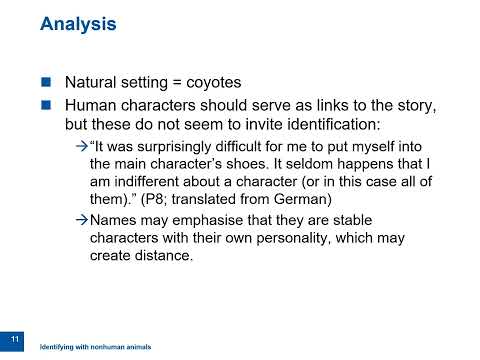 Speaker: Zoë Miljanović @zmiljanovic
Speaker: Zoë Miljanović @zmiljanovic
 Affiliation: RWTH Aachen University
Affiliation: RWTH Aachen University
Title: Identifying with Nonhuman Animals
Abstract (long version below): Empirical ecocriticism is an emerging field that combines insights from the environmental humanities with methods from environmental communication and the empirical study of literature in order to study the impact of environmental narratives in literature, film, television, video games, and other media on attitudes, emotions, perceptions, and behavior (Małecki, 2019; Schneider-Mayerson, Weik von Mossner, et al., 2020). While still relatively new, the field has already generated significant interest in academia and beyond, with special journal issues and edited collections devoted to it (Schneider-Mayerson et al., 2023), as well as media coverage by the likes of Newsweek or Psychology Today. This interest is mainly due to the exciting output generated by empirical ecocriticism on the potential of stories to move the public on today’s most pressing environmental issues such as animal welfare and climate change (Brereton & Gómez, 2020; Iossifidis & Garforth, 2022; Małecki et al., 2016, 2019; Malecki et al., 2021; Myren-Svelstad, 2023; Sabherwal & Shreedhar, 2022; Schneider-Mayerson, 2018; Schneider-Mayerson, Gustafson, et al., 2020). The panel presents new experimental evidence on that potential.
 Long abstract
Long abstract
Environmental narratives may enable readers to reconsider hierarchical understandings of the ecosystem and to identify with out-groups through processes of perspective-taking and empathy during the reading process. Reading fiction has been found to have a positive impact on empathic measures and to push moral reflection (Koopman and Hakemulder 2015) and identification with out-groups may promote empathy (Igartua 2010, 369). Reactions to animal narratives suggest that readers are not ignorant of animal suffering and can adopt animal perspectives (Małecki et al. 2018, 61), even though this may only have a small impact on real-life attitudes (Małecki et al. 2016; 2019). This study empirically explores whether readers identify and empathise with nonhuman characters to similar degrees as with human characters. Using a between-group design, one group read an excerpt from a climate-fiction novel, while the treatment group read a manipulated version, in which the human characters were replaced with animals. Anthropocentric and ecocentric attitudes were measured before, and identification and emotional engagement during the reading experience were measured after reading. Despite a small number of participants, the study reveals interesting tendencies: Average identification was higher for the treatment group, which suggests that the animals are identified with to a higher degree. Average ecocentric attitude was also slightly higher for the treatment group, while these measures were more varied for the control group without any trends of correlation. Because of their supposed shared nature, any inability to relate with the human characters may have an alienating effect. Animal characters may represent a ‘blanker’ option, whose perspectives readers are more willing to adopt. Participants of the control group reported no emotional connection to the characters, whereas the treatment group’s responses revealed emotional engagement with the animals. Considering the limitations of the study, the paper also addresses important alternative explanations.
References
Igartua, Juan-José. 2010. “Identification with characters and narrative persuasion through fictional feature films.” Communications 35. Walter de Gruyter. 347-373.
Koopman, Eva Maria, and Frank Hakemulder. 2015. “Effects of Literature on Empathy and Self-Reflection: A Theoretical-Empirical Framework.” Journal of Literary Theory 9(1). 79-111.
Małecki, Wojciech, Bogusław Pawłowski, and Piotr Sorokowski. 2016. “Literary Fiction Influences Attitudes Toward Animal Welfare.” PLoS ONE 11(12). 1-9.
Małecki, Wojciech, Bogusław Pawłowski, Marcin Cieński, and Piotr Sorokowski. 2018. “Can fiction make us kinder to other species? The impact of fiction on pro-animal attitudes and behavior.” Poetics 66. 54-63.
Małecki, Wojciech, Bogusław Pawłowski, Piotr Sorokowski, and Anna Oleszkiewicz. 2019. “Feeling for textual animals: Narrative empathy across species lines.” Poetics 74. 1-8.

